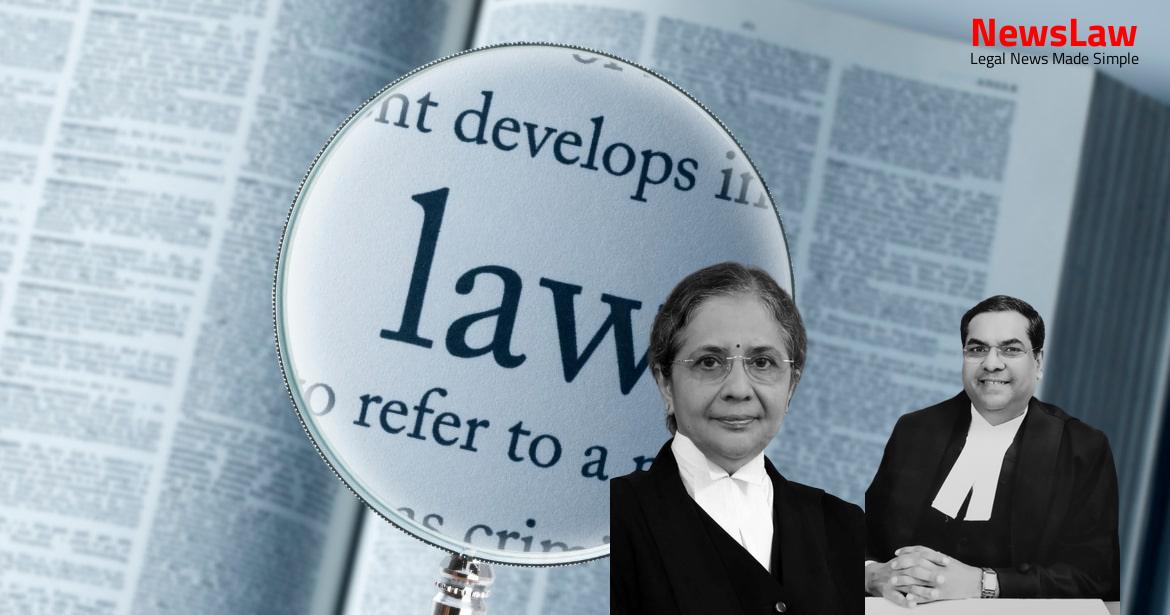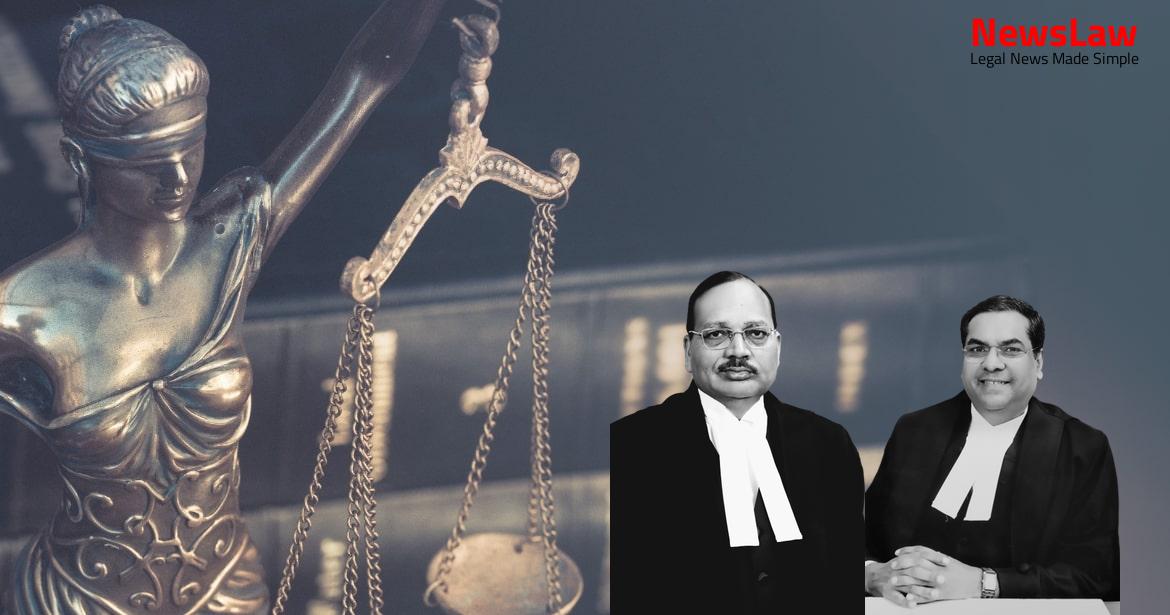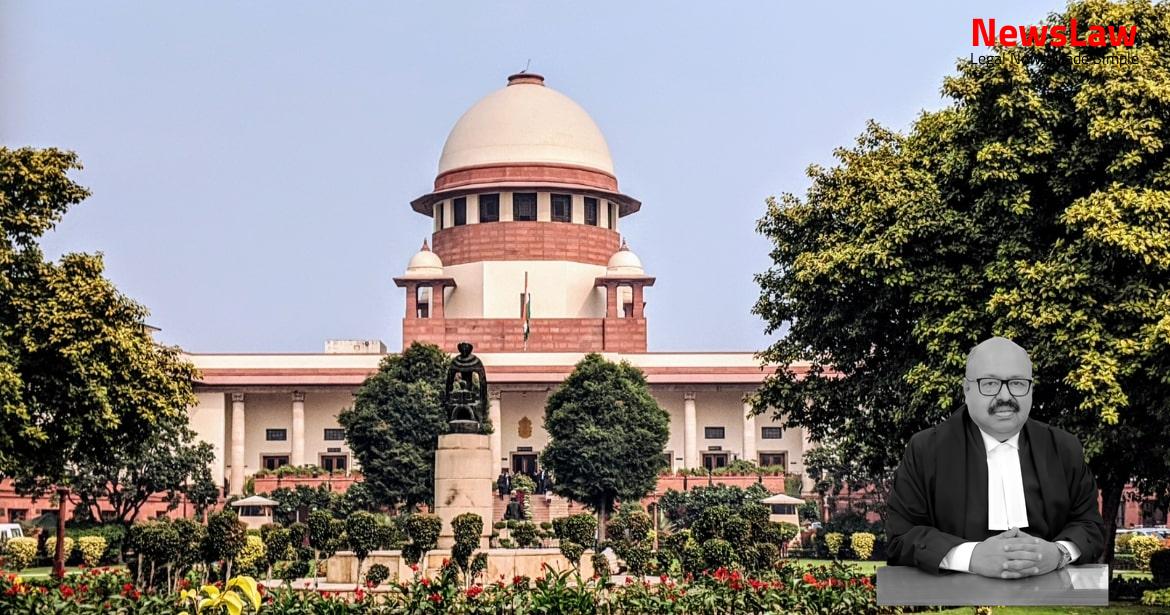Explore a comprehensive legal analysis of a case involving the validity of a relinquishment deed in joint Hindu family property. The court’s examination of principles such as legal necessity, the authority of the Karta, and the nuances of Hindu law provides valuable insights into the complexities of family property management within the legal framework.
Facts
- Plaintiff No. 4 was a minor on 13 March 1969, therefore, their eldest brother had no right to relinquish their shares.
- Plaintiff Nos. 1, 2, and 4 filed a suit seeking declaration of the relinquishment deed as null and void.
- Defendant No. 4 and Defendant No. 3 executed the relinquishment deed in favor of their uncle, which is contested by Plaintiffs.
- The partition deed executed on 15 April 1961 is accepted as valid and legal.
- Defendants primarily argue that the relinquishment deed is valid and the suit is barred by limitation.
- After the death of Patel Mallegowda, his sons were impleaded as Defendants 1 and 2.
- The property in question remained joint Hindu family property due to the void relinquishment deed.
- The Additional Sessions Judge decreed the suit, ruling that Defendant No. 4 was not competent to execute the relinquishment deed, making it void and not barring the suit by limitation.
- Legal representatives of Defendant No. 1 appealed through Regular Second Appeal No. 1989 of 2006, succeeding in the High Court of Karnataka judgment on 19 November 2008.
- The High Court held that the relinquishment deed was not void ab initio and that the suit was barred by limitation, being filed beyond the three years specified in the Limitation Act, 1963.
- The prayer for partition was rejected as the property was no longer considered joint Hindu family property among the three branches.
- The trial court dismissed the suit on grounds of limitation, determining that Defendant No. 4, as the eldest male member, had the right to execute the relinquishment deed for his family branch.
Also Read: Land Auction Dispute Resolution
Analysis
- The relinquishment deed dated 13 March 1969, Exhibit P-2, executed by the fourth defendant would be invalid as the Plaintiff No. 4 was a minor at the time.
- The relinquishment deed clarified doubts and positions regarding the joint family property.
- The rights and interests of the Patel Mallegowda branch were acknowledged through the relinquishment deed.
- Repayment of the mortgage by Patel Mallegowda was a significant factor in the execution of the relinquishment deed.
- Legal necessity and benefit to the estate were crucial aspects in determining the validity of the relinquishment deed.
- The eldest brother, as the head of the joint Hindu family branch, had the authority to manage the property and make decisions on behalf of the branch.
- The relinquishment deed, executed for settling accounts and repayment of debts, was considered valid for legal necessity and benefit to the estate.
- The manager of the joint family property, or Karta, had superior power and rights in decision-making.
- Partition and separation of joint Hindu family properties amongst branches were done by respective representatives of each branch based on the partition deed.
- Alienation of joint family property for legal necessity and benefit to the estate is permissible even without unanimous consent of all coparceners.
- Family settlements and transactions are subject to scrutiny based on factual circumstances and legal necessity.
- Mulla’s Hindu Law recognizes that a father or managing member of ancestral immovable property can make gifts for pious purposes within reasonable limits.
- Sections 6, 8, and 12 of Hindu law need to be viewed together in the context of joint family property management by the Karta.
- The joint Hindu family is a legal entity capable of acting through its Karta and adult members in managing the property.
- The principle of joint tenancy is not applicable in Hindu law outside of joint family property governed by mitakshara law.
- Coparcenary cannot be created by agreement except in the case of reunion, and it is a family unit capable of acquiring, holding, and disposing of property within the limitations of the law.
- A father or eldest member acts as the Karta of a branch within the larger joint family, and Section 6 of the Act defines the natural guardian’s role regarding a minor’s undivided interest in joint family property.
- A Karta can dispose of joint family property involving the minor’s interest, and Thamma Venkata Subbamma case clarifies the validity of relinquishment deeds by coparceners.
- Section 8 of the HMG Act does not affect the Karta’s right to manage joint family property, and no guardian is appointed for a minor’s joint family interest unless no adult member is available.
- Mayne’s Treatise on Hindu Law & Usage and Mulla’s Hindu Law establish the validity of gifts and relinquishments by coparceners with the consent of others.
- Legal necessity in Hindu law allows a father or the eldest member acting as Karta to alienate ancestral property for specific purposes like paying debts or maintenance.
- The concept of legal necessity and the entitlement of the Karta to represent the branch are defined in Mulla’s Hindu Law and case laws like Bhagwan Dayal v. Mst. Reoti Devi.
- Section 8 of the HMG Act does not apply when a Karta or adult head of the family alienates joint Hindu property even if one or more coparceners are minor.
- Guardian of a Hindu minor does not need court permission to dispose of immovable property of the minor in this context.
- The requirement for court permission in Section 8 of the HMG Act specifically applies to a guardian of a Hindu minor, not to a Karta or adult head of the family.
- Plaintiff No. 3 cannot raise new contentions for the first time depriving defendants of defenses like estoppel, acquiescence, and right to restitution.
- The suit challenging the relinquishment deed dated 13 March 1969 was filed on 18 November 1994.
- Limitation Act Articles 58, 59, 60, and 109 were referred in relation to the validity of the relinquishment deed.
- Articles 60 and 109 were analyzed for applicability, and it was found that Article 109 applies when the alienee takes possession of the property within 12 years.
- The suit filed in 1994, 24 years after the execution of the relinquishment deed, is barred by limitation under Article 109.
- Also barred under Articles 58 and 59 as it was filed more than three years from when the right to sue first accrued and when the facts enabling cancellation first came to the knowledge of the plaintiffs.
- The High Court rightly rejected the plaintiffs’ claim of being unaware of the relinquishment deed till two months before filing the suit.
- The appeal is dismissed, and the High Court judgment dismissing the suit as barred by limitation is upheld.
Also Read: Analysis of Bail Conditions in Criminal Appeal No. INSC 48/2024
Decision
- Plaintiff No 3 did not raise the plea of deemed partition in the present appeal.
Also Read: Conviction Upheld for Murder and Concealment of Body
Case Title: M.R.VINODA Vs. M.S.SUSHEELAMMA(D) BY LRS.. (2021 INSC 878)
Case Number: C.A. No.-002567-002567 / 2017



